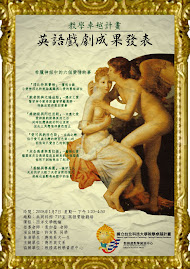Discussion Topics:
(1) What are the marked traits in this TV series that have helped to attract you, a university student in Taipei, to this show?
(2) In addition to the description of interns struggling to become residents, this show is loaded with images of operation room, which are oftentimes bloody, and depictions of flirting and courting, which are sometimes explicit. What do these two elements, i.e., blood and love, affect the audience?
An Overall Introduction of the TV series
A detailed introduction to this TV series can be found at
Grey's Anatomy is a popular Ameican medical drama television series. The show has won two Emmy Awards and two Golden Globe Awards. It portrays the lives of five surginal interns, who later now became residents. Their relationship with their mentors, which is very important in the field of medical studies, is also depicted. Since its premier on March 27, 2005 on ABC, this show has stayed the most watched prime time TV series and entered its sixth season, which starts on September 23, 2009.
The show's title derived from a medical textbook entitled Henry Gray's Anatomy of the Human Body. The change from "Gray" to "Grey" echos the surname of the heroine of the show, i.e., Meridith Grey. This linkage highlights the show's focus: A medical doctor's life as a professional and as an ordinary female.
What's so special about this show in relation to multi-media popular culture is that each episode is characterized with its association with a popular song, which is used mainly in the beginning and the ending of the episode to reinforce the theme or moral of the storyline. In many cases, the episode is named after a song, and this provides more chances for the viewers to immerse into the storyline.
The characters in the show include people of different ethinicities. A color-mixing technique is adopted to create a racially diverse cast that includes African Americans, white people, and Asian Americans.
The first season introduces five main characters who serve as interns in the fictional Seattle Grace Hospital in Washington State:
1. Meredith Grey
Her mother, Ellis Grey, was a famous surgeon and died as an Alzheimer patient. Her father left the family when she was five years old. He married another woman and had a daughter named Lexie, who becomes an intern later at the same hospital where Meredith serves as a resident. Meredith develps a sense of insecurity that deters her from a stable and steady relationship with her lovers, especially Derek, whose marriage proposal to her is turned down after he got a devorce with his ex-wife Allison Shephard.)
2. Alex Karev
3. George O'Malley
He failed in the intern test and had to serve as an intern for the second year.In the beginning of the first season, he was attracted to Meredith. Then he got married with another surgeon, and the marriage ended with an affair with another of his colleagues, Izzie.
4. Izzie Stevens
She once posed for a magazine as a model to pay her way through medical school.
5. Christina Yang
She is a Korean American who devotes herself to her career. She was in a relationship with the residing surgeon, Dr. Burk, but got left alone at the alter.
Their mentors include:
1. Miranda Bailey ("Nazi")
She is an African American. She is a general surgeon who serves as the Chief Resident.
2. Richard Webber
He is an African American who serves as the Chief of Surgery of the surgical program. He once had a relationship with Meredith's mother when she was then working there.
3. Derek Shapherd ("Mr. McDreamy")
He is an attendng physician and develops love relationship with Meredith. After he divorced his wife, he would like to marry Meredith, but she was not ready.
4. Preston Burk
He is an African American. He is the other attending physician and develops a relationship with Christina--only to desert her at the alter on their wedding day. After the indcident, he resigned his job at the hospital and sent his mother to say good-bye to Christina.
Discussion Topics:
(1) What are the marked traits in this TV series that have helped to attract you, a university student in Taipei, to this show?
(2) In addition to the description of interns struggling to become residents, this show is loaded with images of operation room, which are oftentimes bloody, and depictions of flirting and courting, which are sometimes explicit. What do these two elements, i.e., blood and love, affect the audience?















